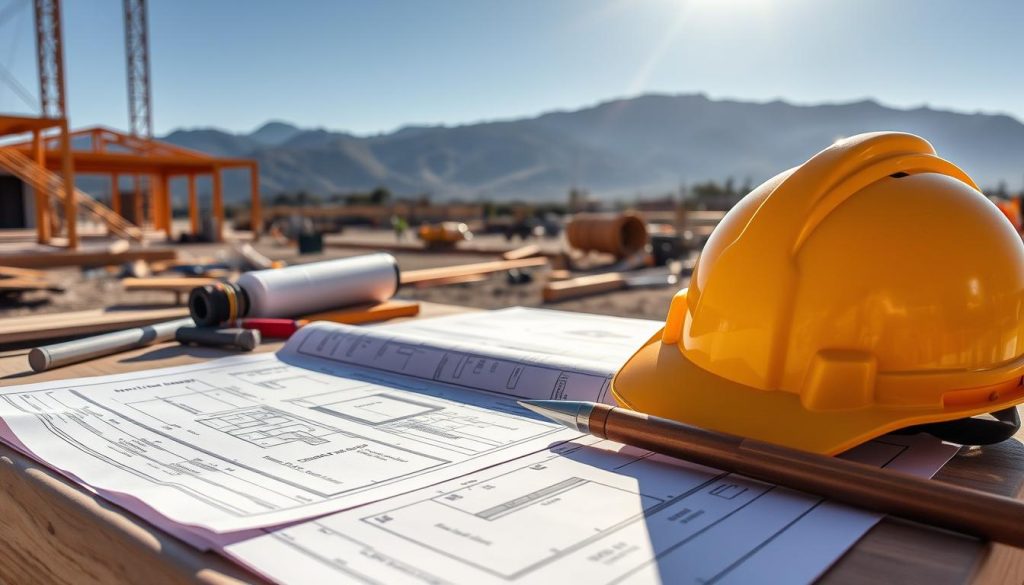Did you know nearly 90% of California homeowners prefer licensed contractors for their projects? This shows the importance of licensed contractors for quality and safety in California’s construction world. The California General Contractor Licensing process checks that contractors are qualified. It also protects homeowners by requiring rules and standards to be followed.
In this detailed guide, we’ll cover key facts about general contractor licensing. We’ll explain why it’s popular among homeowners to hire California general contractors. If you’re planning big renovations or small home improvements, knowing about this license is key. You’ll learn about who can get licensed and why hiring licensed experts is good. We want to give you the info you need to choose wisely for your project.
Key Takeaways
- Licensed contractors are vital for quality home renovations in California.
- A contractor’s license ensures compliance with safety standards and legal requirements.
- Understanding the licensing process helps homeowners make informed hiring decisions.
- Licensed contractors provide peace of mind and consumer protection.
- Homeowners are encouraged to verify the performance history of potential contractors.
Understanding General Contractor Licensing
Let’s start by asking what is a general contractor? They’re the ones in charge from the beginning to the end of construction projects. They manage workers, keep schedules on track, and ensure budgets are met. Projects can range from kitchen remodels to building Accessory Dwelling Units (ADUs). General contractors make sure work is safe, meets local codes, and follows the design plans.
What is a General Contractor?
A general contractor plays a key role in construction. They coordinate everything, making sure the quality is up to par. In California, general contractors must have a license for projects over $500. This emphasizes the importance of licensed contractors in California. The law ensures that only qualified, experienced individuals with the correct licensing can lead significant projects. This helps avoid the risks of hiring unlicensed contractors, like poor workmanship or legal issues.
Importance of Licensing in Construction
There’s more to hiring a licensed contractor than just following the law. These contractors must prove they have four years of relevant experience. They also have to pass exams on their trade and business law. Plus, they go through criminal background checks and must have insurance. All this gives homeowners confidence that their project is in good hands.
Hiring someone without a license can bring big problems. Homeowners could face fines up to $5,000 and other penalties up to $15,000 per violation. If something goes wrong, there’s also the risk of paying for damages out of pocket. There’s even less protection from insurance.
The Contractors State License Board (CSLB) stays on top of this by conducting undercover operations. Choosing a licensed contractor means you’re getting someone who follows the rules. It ensures projects like seismic upgrades and water damage repair are done right. Licensed professionals guarantee transparent pricing and reliable project delivery.
| Criteria | Licensed Contractors | Unlicensed Contractors |
|---|---|---|
| Compliance with State Laws | Yes | No |
| Insurance Coverage | Required | Often Lacking |
| Risk of Fines | Minimal | High |
| Quality Assurance | Guaranteed | Substandard |
| Consumer Legal Recourse | Available | Limited |
Licensing Requirements in California
Understanding the licensing requirements in California makes sure both contractors and homeowners follow safe construction practices. It’s essential for contractors to meet these criteria to keep industry standards high. This also helps to protect the rights of consumers.
Eligibility Criteria for Applicants
To get a general contractor license in California, there are important prerequisites. Applicants must have at least four years of journey-level experience. They need to pass a trade exam and a business law exam. A criminal background check is also required for all new contractors.
Required Documentation and Forms
General contractors need to gather several key documents to apply. These documents are crucial:
- Proof of experience in the trade.
- A completed application form.
- Evidence of passing the necessary examinations.
Getting these documents ready beforehand makes the approval process smoother. It also helps meet California’s licensing rules. Homeowners should know these requirements to ensure they hire skilled professionals for their projects.
| Document | Description |
|---|---|
| Proof of Experience | Documentation verifying four years of journey-level experience in a specific trade. |
| Application Form | A completed form showing the desire to get a contractor license. |
| Examination Evidence | Proof of having passed the trade and business law exams. |
The Application Process
Getting a general contractor license in California is key for future contractors. Knowing the steps to apply helps make the journey smoother. Here, we outline what you need to do and the fees involved.
Steps to Apply for a General Contractor License
The first step is to get all your documents ready and meet the eligibility requirements. Here’s a brief rundown of the steps:
- Verify eligibility: Make sure you’re at least 18, have a Social Security Number or ITIN, and a driver’s license.
- Gain experience: You need four years of experience in construction in the last 10 years.
- Complete coursework: Do at least 32 hours of approved construction-related courses.
- Fill out the application form: Send your application to the Contractors State License Board (CSLB).
- Pass examinations: Take and pass the business and law exam, and the trade exam for your area.
- Undergo background checks: Do fingerprinting and background checks to show you’re eligible.
- Secure a surety bond: Get a surety bond or cash deposit to protect your clients against financial loss.
Processing Time and Fees
Applications take several weeks to process. This time is needed for reviewing documents and doing background checks. Knowing the fees for a California general contractor license is important for planning your budget. Here are the costs:
| Fee Type | Cost |
|---|---|
| Application Fee | $300 |
| Exam Fee | $100 |
| Licensing Fee (initial) | $200 |
| Surety Bond or Cash Deposit | Variable (depends on the project) |
Understanding the license application process is the first step towards a career in construction. It prepares you for what’s ahead and helps you join the industry smoothly.
Types of General Contractor Licenses
In California, it’s essential for homeowners to know about the different general contractor licenses. There are over 50 types of licenses, each for specific construction tasks. This ensures homeowners find the right expert for their project.
Classifications of Licenses in California
California has three main contractor license classes: Class A General Engineering Contractor, Class B General Building Contractor, and Class C Specialty Contractor. Class B licenses are very common. The B-2 Residential Remodeling license is for contractors working on homes up to three stories. Remember, projects over $500 need a certified B-2 contractor. Projects under this price don’t have to follow these rules.
| License Classification | Scope of Work | Common Projects |
|---|---|---|
| Class A | Engineering projects | Heavy construction, dams, bridges |
| Class B | General building projects | Residential homes, commercial buildings |
| Class C | Specialty trades | Plumbing, electrical, roofing |
Choosing the Right License for Your Business
Finding the best contractor in California means understanding license classifications. Homeowners should ensure contractors have the right license for their project. Also, ask about the contractor’s experience with similar work. This makes homeowners more confident in their choice.

Continuing Education and License Renewal
In California, it’s important for general contractors to keep learning. They need to stay updated on new laws, regulations, and ways to build safely and effectively. This is why ongoing education is key.
Ongoing Education Requirements
If you’re a contractor in California, you have to finish certain courses to renew your license. These courses cover important stuff like:
- Safety regulations
- New construction laws
- Best practices in project management
- Environmental responsibilities
Renewal Process and Deadlines
The process to renew a license in California is strict but straightforward. Contractors must hand in their renewal form and show they’ve finished their required courses. Missing a deadline could mean you can’t work until things are sorted out.
Below is a quick guide to renewing your license in California:
| Step | Details |
|---|---|
| 1 | Complete required continuing education courses. |
| 2 | Prepare and submit a renewal application. |
| 3 | Pay necessary renewal fees. |
| 4 | Await confirmation of license renewal. |
Common Challenges and FAQs
Finding your way through contractor licensing can be tricky for homeowners. It’s usual to have questions about what licenses are needed, checking a contractor’s credentials, and actions if an unlicensed person is found working. Knowing the frequently asked questions about licenses is essential. By using sites like the Contractors State License Board’s, homeowners can make sure they hire true pros.
Frequently Asked Questions About Licensing
Knowing if a contractor is reliable and skilled is a big worry. Homeowners need to pick those with a good business history. They should ask for references from three past clients on similar projects. Making sure a contractor’s license is valid through groups like the Better Business Bureau is also key. This helps avoid the common challenges in contractor licensing.
Overcoming Common Licensing Hurdles
To deal with these issues well, homeowners should do their homework on contractors. This means checking their license and if they have enough insurance. This includes $2 million in liability insurance and workers’ comp. Talking clearly with contractors about timelines, changes, and guarantees is also crucial. These steps not only ease worries but also make building projects go smoother. For more tips and a full guide, check out benefits of using general contractors. This site and the Contractors State License Board can answer more of your questions.
FAQ
Why is it important to hire a licensed general contractor in California?
Hiring a licensed general contractor in California means they know the local building codes and safety rules. This assures homeowners that the work will meet standards and reduces risks from poor workmanship.
What should I look for when choosing a general contractor?
When choosing a general contractor, make sure they have the correct license and a lot of experience. It’s also good to read feedback from their past clients. Asking about their special skills for your project is helpful too.
What are the ongoing education requirements for general contractors in California?
In California, general contractors must finish hours of continuing education before they renew their license. This keeps them up-to-date on construction laws, safety rules, and industry trends.
How can I verify a contractor’s license in California?
You can check a contractor’s license on the Contractors State License Board (CSLB) website. This shows if their license is valid and gives more information on their work history.
What are the common challenges homeowners face when hiring contractors?
It can be hard to understand the different types of licenses and how to check them. Learning about licenses and carefully choosing a contractor can avoid problems with unlicensed workers.
What fees are associated with obtaining a general contractor license in California?
Getting a general contractor license in California involves paying for the application, tests, and the license itself. The total cost varies based on the license type and details.
Can homeowners benefit from hiring general contractors for renovations?
Yes, hiring general contractors for renovations is beneficial. They keep the project within budget and on time. Their knowledge ensures the work follows safety and building codes. This makes the renovation smoother and more likely to succeed.
Source Links
- https://dcba.lacounty.gov/portfolio/hiring-a-contractor/
- https://www.contractors.com/benefits-hiring-licensed-contractor/
- https://www.contractorslicensingschools.com/blog/can-a-residential-contractor-work-on-commercial-jobs-in-california/
- https://www.sierravistawindowandguttercleaning.com/importance-of-licensed-contractors-in-california/
- https://www.baycitiesconstruction.com/blog/licensed-general-contractors-what-can-general-contractors-do
- https://www.contractorslicensingschools.com/blog/do-i-need-a-license-to-work-on-my-home-in-california/
- https://www.houzz.com/pro-learn/blog/startup-guide-residential-construction-general-contractor-license-requirements-california
- https://mbkchapman.com/blog/home-improvement-contract-california/
- https://finturf.com/blog/general-contractors-license-california/
- https://sweeten.com/blog/home-renovation-process/hiring-guide-general-contractors-professionals/
- https://kitchenhomeandbath.com/10-tips-to-find-a-good-contractor/
- https://www.contractorslicensingschools.com/blog/california-home-improvement-contracts-101/
- https://www.nextinsurance.com/blog/california-general-contractor-license-and-insurance-requirements/
- https://cpsa.phta.org/advocacy/cslb-open-letter/
- https://www.harborcompliance.com/home-improvement-contractor-company
- https://www.betterbuilders.com/blog/19-questions-to-ask-when-hiring-a-general-contractor-your-ultimate-guide
- https://forum.heatinghelp.com/discussion/195883/homeowners-versus-contractors
- https://goasher.com/home-improvement/questions-to-ask-a-contractor/


